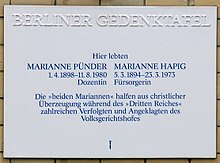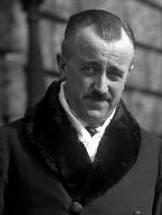Marianne Pünder
Marianne Pünder (born April 1, 1898 in Cologne ; † August 11, 1980 in Berlin ), a younger sister of Werner and Hermann Pünder , was a doctor of economics and constitutional law , she became a lecturer and headmistress of what was then the "Helene Weber School" in Berlin and worked together with Marianne Hapig in the German resistance against National Socialism .
Family and education
Marianne, born in Cologne, the youngest child of Hermann Josef Pünder, a judge at the Higher Regional Court , moved to Berlin in 1900 because her father had been appointed to the newly created Reich Military Court. Brother Werner Pünder became a lawyer and notary in Berlin, a second older brother was Hermann Pünder , State Secretary and Head of the Reich Chancellery until 1933. She graduated from high school in 1918 and studied economics in Berlin and Freiburg im Breisgau . She received her doctorate in 1923 ( Dr. rer. Pol. ) With a dissertation on “The history of ideas in the Christian national labor movement” by the social law expert Karl Diehl . She also trained as a kindergarten teacher at the German Caritas Association .
Professional activity
The beginning of the professional life was in 1921 the brief activity as private secretary of Hedwig Dransfeld . After working at Thyssen AG in Hamburg and in the administration of the Caritas Association in Freiburg im Breisgau and Berlin, Pünder was appointed lecturer at the Social Women's School of the Catholic German Women's Association (KDFB) in Berlin, which is now called the Catholic University of Social Sciences Berlin , and in 1991 in Karlshorst in the building of a former hospital as a university of applied sciences.
Since 1926, this social women's school has been housed in a large school building with a dormitory on the Lietzenseeufer in Charlottenburg. Pünder taught several subjects and also participated in the conceptual preparation of social education as a subject. Together with the director Paula Rengier , she managed to maintain the school during the difficult years between 1933 and 1945 and later to steer it through the post-war period. This former “Catholic School for Social Work” of the women's association was named in 1962 after Helene Weber . From 1957 to 1965 Pünder headed this “Helene Weber School”, which instead of “welfare workers” later trained “social workers”. Men were also admitted as students. Marianne Pünder stayed in Berlin until her death and was a formative figure in the city's Catholic milieu.
For many years she was a member of the governing bodies of the Catholic German Women's Association (KDFD).
In 1932 she was a member of a German delegation to the League of Nations .
Silent heroine of the resistance
Together with friend Marianne Hapig
She lived with her friend Marianne Hapig at Marienstraße 15 in Berlin-Steglitz, where a plaque commemorates both of them with the following text: "Out of Christian conviction, the two Marians helped numerous persecuted and accused of the People's Court during the 'Third Reich'."
After the failed Hitler assassination attempt on June 20, 1944 , Marianne Pünder and her like-minded friend Marianne Hapig (that's why they were called the "two Marianne") looked after the wives of the arrested. Both brought laundry and groceries to the prison and smuggled out cashiers .
The following is noted in the 1932 yearbook of the Federation of German Women's Associations :
Marianne Hapig faced another challenge in connection with the assassination attempt on Hitler on July 20, 1944. She looked after those persecuted, including members of the Kreisau Circle who had been imprisoned by the Gestapo and had to answer before the People's Court . The prisoners and their families needed support because the relatives usually did not know where their loved ones were and under what conditions they were living in the prisons. Marianne Hapig, with the support of her friend Marianne Pünder, who was a lecturer at the KDF's social school for women, was able to help some of these people.
In order to be able to contact the prisoners, their whereabouts had to be found out. The relatives had to be informed in order to provide them with additional food and to organize the linen exchange, which was also used to convey messages. Contacts were established with employees of the facilities in order to enable help. These activities were dangerous and life threatening. Marianne Hapig and Marianne Pünder smuggled the notes written by the Jesuit Father Alfred Delp , who was executed in prison in February 1945 , and which were later published under the title 'In the Face of Death'. "
Rescue the Brother
A special occasion for her work was the arrest of her brother on July 21, 1944 in Munster after the assassination attempt on Hitler and his later transfer to Berlin by the Secret State Police . There he was imprisoned for four months in the Lehrter Strasse cell prison and was interrogated. It all came down to the defense in the process and a possible influence on the relevant people, above all on Freisler.
By threading a spectacular contact between Heinz Tietjen and Roland Freisler , the chairman of the People's Court, Marianne Pünder obtained her brother Hermann's acquittal - for lack of evidence - in the process at the People's Court . The co-defendant Eugen Bolz was sentenced to death in the same proceedings.
But because of this her brother did not gain freedom; He was taken into protective custody and first locked up in the Ravensbrück concentration camp in a special cellar prison of the Drögen Security Police School . Towards the end of the war, the special prisoners were brought to the so-called Alpine fortress via Buchenwald , Schönberg , Dachau and ended up in a hotel on Lake Braies in South Tyrol . There they were a brave before being shot by the SS guards rescue operation saved.
Assistance to the arrested
The following other political prisoners were supported by the initiative of the "two Marians":
- Andreas Hermes (1878–1964), political scientist and politician
- Hans Lukaschek (1885–1960), politician
- Ferdinand Freiherr von Lüninck (1888–1944), officer and politician
- Walter Cramer (1886–1944), textile entrepreneur
- Bernhard Letterhaus (1894–1944), union leader and politician
- Hermann Pünder (1888–1976), brother, politician
- Otto Geßler (1875–1955), politician
Honors
Marianne Pünder and Marianne Hapig were honored together on a Berlin memorial plaque (see picture above)
She was awarded the Federal Cross of Merit, 1st class .
literature
- Marianne Pünder , Hewig Dransfeld. In: Helmut Stupperich (Ed.): Westfälische Lebensbilder. Volume XII, Münster 1979, pp. 145-161.
- Tilman Pünder: In the clutches of the Nazi state. State Secretary Dr. Hermann Pünder 1944/45. Münster, Aschendorff 2018, ISBN 978-3-402-13310-1 .
- * Philipp Gatzka: Hermann Pünder. Personality and work of a top German civil servant in the Weimar Republic. Shaker Verlag, Aachen 2016, ISBN 978-3-8440-4479-9 . (at the same time Diss. phil. Univ. of Cologne)
Individual evidence
- ^ Tilman Pünder: From Rhenish citizens . Edition Octopus, Münster 2013, pp. 193–195, 223.
- ↑ Marianne Hapig (1894-1973). In: Social Work. No. 9-10, 2013, pp. 420f. (www.dzi.de , accessed on February 10, 2019)
- ^ Tilman Pünder: In the clutches of the Nazi state. State Secretary Dr. Hermann Pünder 1944/45. Münster, Aschendorff 2018, pp. 46–54.
- ^ Tilman Pünder: In the clutches of the Nazi state. State Secretary Dr. Hermann Pünder 1944/45. Münster, Aschendorff 2018, pp. 88–98.
- ^ Tilman Pünder: In the clutches of the Nazi state. State Secretary Dr. Hermann Pünder 1944/45. Münster, Aschendorff 2018, pp. 124–176.
- ↑ Johannes Tuchel: ... and the rope is waiting for all of you. The cell prison Lehrter Strasse 3 after July 20, 1944. Lukas Verlag, 2014, ISBN 978-3-86732-178-5 .
Web links
- https://www.bbkl.de/public/index.php/frontend/lexicon/P/Pu-Py/puender-marianne-85446
- Frauenbundhaus, Haus Helene Weber, accessed on February 10, 2019
| personal data | |
|---|---|
| SURNAME | Pünder, Marianne |
| BRIEF DESCRIPTION | German doctorate in economics and constitutional law, resistance to the Nazi regime |
| DATE OF BIRTH | April 1, 1898 |
| PLACE OF BIRTH | Cologne |
| DATE OF DEATH | August 11, 1980 |
| Place of death | Berlin |


